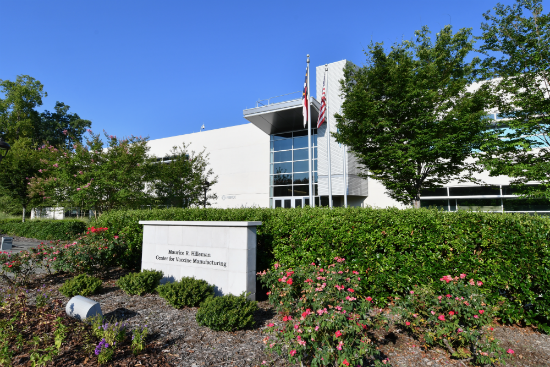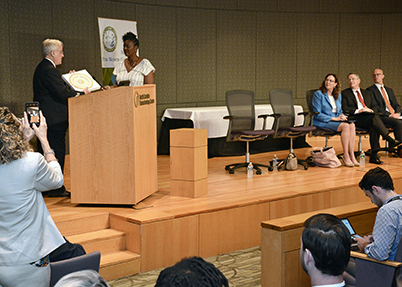
Merck Adding $680M, 425 workers to North Carolina Vaccine Production

North Carolina's global leadership in pharmaceutical manufacturing took another leap today with Merck’s announcement that it will invest $680 million in its two major facilities in Durham and Wilson and add at least 425 more workers to its North Carolina vaccine production workforce.
The Maurice R. Hilleman Center for Vaccine Manufacturing in Durham will benefit significantly from the arrival of a new product – and hundreds of millions of investment dollars that come with it – over the next few years. However, as part of the transition, it will also relinquish production of its diminishing varicella product for chickenpox and shingles vaccines, meaning people working in that sector will lose their jobs -- at least until new lines of production restart.
The North Carolina Department of Commerce and Merck announced that the company will build a 225,000 square-foot addition to its vaccine-manufacturing site in Durham's Treyburn Corporate Park. It will be used to produce active ingredient for Gardasil and Gardasil 9 recombinant human papillomavirus (HPV) vaccines. The facility will take three to four years to complete and bring online, at an investment of greater than $650 million. And it will eventually add more than 400 new jobs to Merck’s Durham workforce.
The company also will make a $30 million investment at its Wilson plant to add packaging lines and expand warehouse space. It will mean an increase of more than 30 positions there.

The announcement, held at the North Carolina Biotechnology Center, included dozens of local and state elected officials, economic development specialists and life science business and academic leaders. State Commerce Secretary Anthony M. Copeland made the announcement. Marlene Sanders, associate director for government accounts, represented Merck at the event. Speakers also included Wendy Jacobs, chair of the Durham County Commissioners, and Keith Merrick, board chair of Wilson County Economic Development.
“Merck is delighted to bring additional investment and jobs to North Carolina,” said Sanat Chattopadhyay, the company’s executive vice president and president of its manufacturing division, in a prepared statement. “Our Durham and Wilson plants are key strategic sites in the Merck global manufacturing network. And the strong support of the state is critical for the success of businesses such as ours.”
The two projects qualify Merck for a state Job Development Investment Grant of up to $5 million over the next 12 years if the company meets its job targets. Merck has committed to add a combined total of 425 new positions at Durham and Wilson during that time, with an average annual salary of about $73,382.

Marlene Sanders as Wendy Jacobs, Keith Merrick and
Bill Bullock share in the celebration.
“The life science industry cluster in North Carolina enjoys a well-earned reputation as one of the nation’s leading centers for biotech innovation,” said Copeland, who was introduced by Bill Bullock, NCBiotech's senior vice president of economic development and statewide operations. “Merck’s long experience in our state gave them the confidence to bring this important new operation to North Carolina.”
As part of the investment, however, the Durham factory will cease production of its varicella product used in chickenpox and shingles vaccines, resulting in immediate elimination of about 150 full-time Merck jobs. A similar number of positions held by contract workers will end. The plant's workforce until today was approximately 800.
The company said all its employees involved in the layoff will receive a comprehensive severance package, including two months of pay and benefits and help finding other employment, because Merck won't be able to begin producing the HPV vaccine at the expanded Durham factory until sometime in 2022.
Since Merck broke ground on its Durham facility in 2004, it has invested some $1.6 billion in the campus. The 259-acre site is named for the late Maurice R. Hilleman, Ph.D., a noted microbiologist and Merck vaccine researcher, who died in 2005. Hilleman is credited with developing more than 40 vaccines, helping to save more lives than any other medical scientist in the 20th century.
GARDASIL and GARDASIL 9 are increasingly important vaccines globally. Some 614,000 people are diagnosed with HPV-related cancers each year, and Merck's vaccines dominate the market for prevention of those dangerous viral infections.
Countries around the world have enacted new or expanded HPV vaccination programs, creating an unprecedented increase in global demand. Merck, known as MSD outside the U.S. and Canada, sells prescription medicines, vaccines, biologic therapies and animal health products in more than 140 countries around the world. It's investing $16 billion in capital projects during the coming five years, with a significant portion going to vaccine production like the output from the company's North Carolina facilities.
Merck said all the bulk drug product for its varicella vaccines will now be produced at the company's West Point, Pa. plant, which is the only site approved globally for those vaccines.
